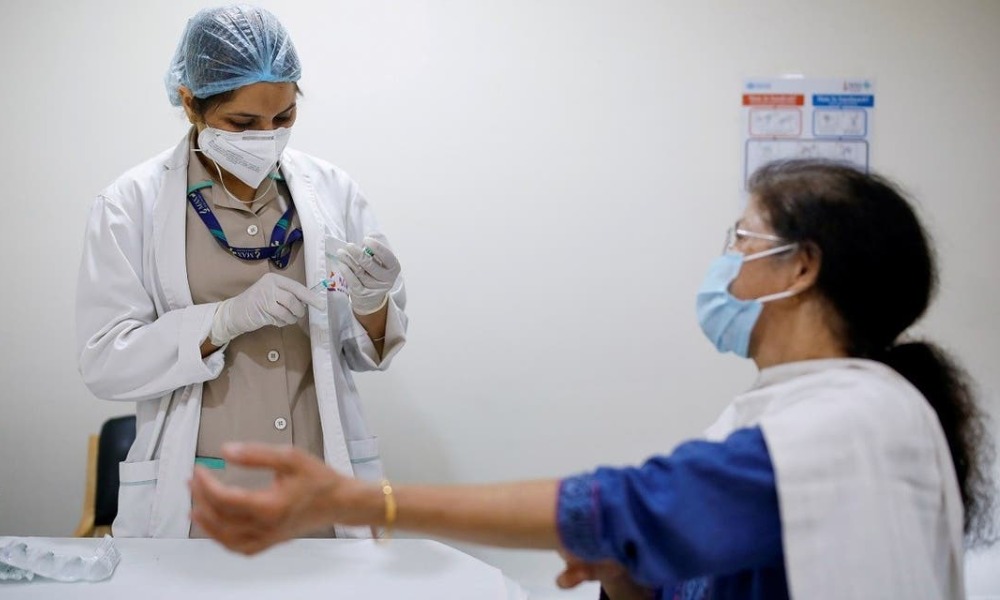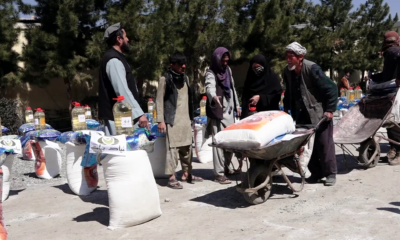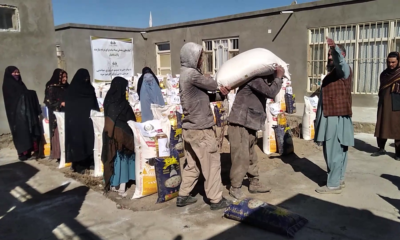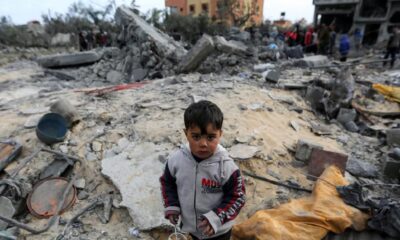COVID-19
Indian doctors describe COVID situation as chaotic

India reported a record 200,000 new COVID-19 cases on Thursday as the financial hub of Mumbai entered a lockdown and many hospitals treating coronavirus patients reported severe shortages of beds and oxygen supplies.
The surge was the seventh record daily increase in the last eight days and comes as India battles a massive second wave of infections that has its epicentre in the economically significant state of Maharashtra, home to Mumbai, Reuters reported. The western state accounts for about a quarter of the country’s total cases.
India reported 200,739 COVID-19 cases over the last 24 hours, according to health ministry data released Thursday. Deaths stood at 1,038, taking the total to 173,123.
The total caseload reached 14.1 million, only second to the United States, which leads the global tally with 31.4 million cases.
According to Reuters, hospitals and doctors in Maharashtra as well other regions including Gujarat and Delhi in the north reported chaotic scenes as healthcare facilities were overwhelmed with a surge in admissions of COVID-19 patients.
“The situation is horrible. We are a 900-bed hospital, but there are about 60 patients waiting and we don’t have space for them,” said Avinash Gawande, an official at the Government Medical College and Hospital in Nagpur, a commercial hub in Maharashtra.
Hospitals in other places including Gujarat, Prime Minister Narendra Modi’s home state, reported oxygen shortages. “If such conditions persist, the death toll will rise,” the head of a medical body in Ahmedabad wrote in a letter to the Gujarat state chief minister.
India’s government said the country was producing oxygen at its full capacity everyday for the last two days and it had boosted output.
“Along with the ramped up production of the oxygen manufacturing units and the surplus stocks available, the present availability of oxygen is sufficient,” the health ministry said in a statement on Thursday.
Meanwhile, hundreds of thousands of pilgrims still thronged to a religious festival in the north of the country on Wednesday, stoking fears of a new surge in COVID-19 cases in the region, Reuters reported.
In capital Delhi, daily COVID-19 cases are hitting new records, with doctors warning the surge could be deadlier than in 2020.
“This virus is more infectious and virulent …. We have 35-year olds with pneumonia in intensive care, which was not happening last year,” said Dhiren Gupta, a pediatrician at Sir Ganga Ram Hospital in New Delhi. “The situation is chaotic.”
COVID-19
WHO declares end to COVID global health emergency

The World Health Organization said Friday that COVID-19 no longer qualifies as a global emergency, marking a symbolic end to the devastating coronavirus pandemic that triggered once-unthinkable lockdowns, upended economies and killed millions of people worldwide.
The announcement, made more than three years after WHO declared the coronavirus an international crisis, offers some relief, if not an ending, to a pandemic that stirred fear and suspicion, hand-wringing and finger-pointing across the globe, AP reported.
The U.N. health agency’s officials said that even though the emergency phase was over, the pandemic hasn’t finished, noting recent spikes in cases in Southeast Asia and the Middle East.
WHO says thousands of people are still dying from the virus every week, and millions of others are suffering from debilitating, long-term effects.
“It’s with great hope that I declare COVID-19 over as a global health emergency,” WHO Director-General Tedros Adhanom Ghebreyesus said.
“That does not mean COVID-19 is over as a global health threat,” he said, warning that new variants could yet emerge. Tedros noted that while the official COVID-19 death toll was 7 million, the real figure was estimated to be at least 20 million.
Tedros said the pandemic had been on a downward trend for more than a year, acknowledging that most countries have already returned to life before COVID-19.
He bemoaned the damage that COVID-19 had done to the global community, saying the pandemic had shattered businesses, exacerbated political divisions, led to the spread of misinformation and plunged millions into poverty.
When the U.N. health agency first declared the coronavirus to be an international crisis on Jan. 30, 2020, it hadn’t yet been named COVID-19 and there were no major outbreaks beyond China.
More than three years later, the virus has caused an estimated 764 million cases globally and about 5 billion people have received at least one dose of vaccine.
In the U.S., the public health emergency declaration made regarding COVID-19 is set to expire on May 11, when wide-ranging measures to support the pandemic response, including vaccine mandates, will end. Many other countries, including Germany, France and Britain, dropped most of their provisions against the pandemic last year.
When Tedros declared COVID-19 to be an emergency in 2020, he said his greatest fear was the virus’ potential to spread in countries with weak health systems.
Most recently, WHO has struggled to investigate the origins of the coronavirus, a challenging scientific endeavor that has also become politically fraught.
COVID-19
COVID-19 in Iran: Nearly 900 new cases, 24 deaths recorded

The Iranian health ministry announced on Sunday that more than 890 new cases of COVID-19 have been identified across the country during the past 24 hours, adding that 24 patients have died in the same period of time, Fars News Agency reported.
“A sum of 891 new patients infected with COVID-19 have been identified in the country based on confirmed diagnosis criteria during the past 24 hours,” the Iranian Health Ministry’s Public Relations Center said on Sunday, adding, “454 patients have been hospitalized during the same time span.”
The ministry’s public relations center said 611 people infected with COVID-19 are in critical condition.
COVID-19
China says 200 million treated, pandemic ‘decisively’ beaten

China says more than 200 million of its citizens have been diagnosed and treated for COVID-19 since it lifted strict containment measures beginning in November.
With 800,000 of the most critically ill patients having recovered, China has “decisively beaten” the pandemic, according to notes from a meeting of the ruling Communist Party’s all-powerful Politburo Standing Committee presided over by President and party leader Xi Jinping, AP reported.
China enforced some of the world’s most draconian lockdowns, quarantines and travel restrictions and still faces questions about the origins of the virus that was first detected in the central Chinese city of Wuhan in late 2019. Heavy-handed enforcement prompted rare anti-government protests and took a heavy toll on the world’s second-largest economy.
The official Xinhua News Agency quoted Xi as saying that policies to control the outbreak had been “entirely correct.” The abrupt lifting in November and December of the “zero COVID” policy that had sought to eliminate all cases of the virus led to a surge in infections that temporarily overwhelmed hospitals.
Case numbers have since peaked and life has largely returned to normal, although international travel in and out of China has yet to return to pre-pandemic levels.
China is now transitioning to a post-pandemic stage after a fight against the outbreak that was “extraordinary in the extreme,” Xinhua said.
The government will continue to “optimize and adjust prevention and control policies and measures according to the times and situations with a strong historical responsibility and strong strategic determination,” Xinhua said.
-

 World5 days ago
World5 days agoTrump and Putin expected to speak this week as US pushes for Russia-Ukraine ceasefire
-

 Latest News4 days ago
Latest News4 days agoNational Journalists Day sparks reaction from Afghanistan’s media workers
-

 World3 days ago
World3 days agoPutin agrees to 30-day halt on energy facility strikes in Ukraine
-

 Sport3 days ago
Sport3 days agoIPL 2025 celebrates 18 years of immense success
-

 Latest News3 days ago
Latest News3 days agoBayat Foundation helps needy families in Kabul during Ramadan
-

 Latest News4 days ago
Latest News4 days agoIEA urges neighboring countries to stop forced expulsions of Afghan refugees
-

 Latest News2 days ago
Latest News2 days agoTorkham crossing to reopen after 25-day shutdown
-

 Latest News3 days ago
Latest News3 days agoAfghan-Pakistan talks to reopen Torkham border ‘end on positive note’
























